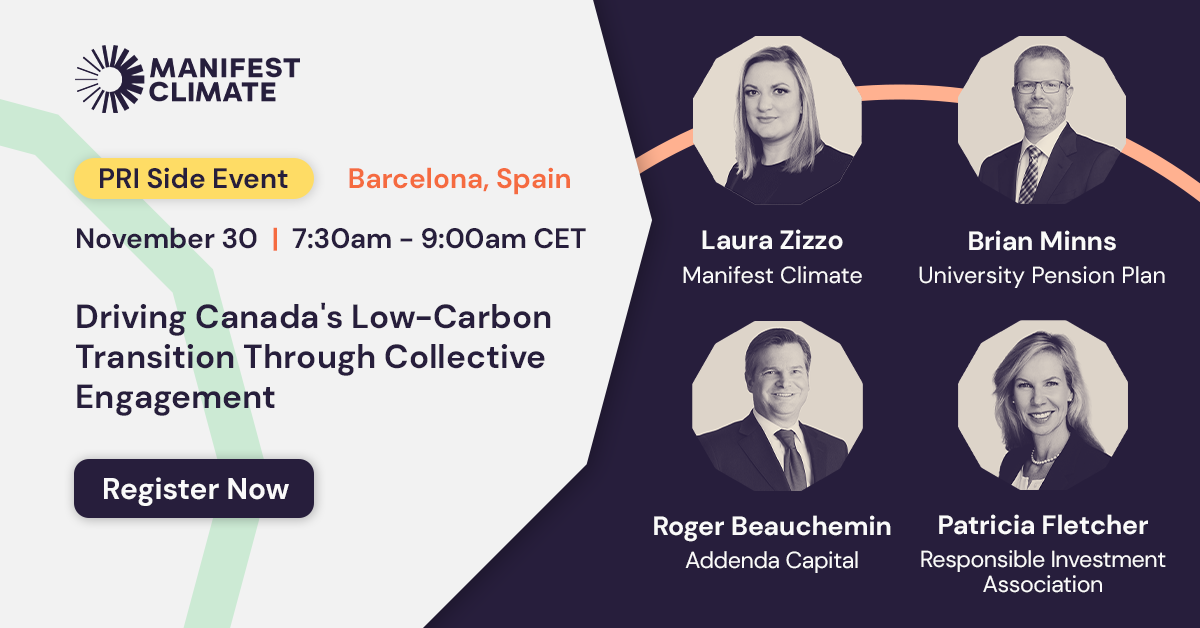The second week of the United Nations (UN) Climate Change Conference (COP27) saw frenzied discussions between developed and developing countries on an array of topics crucial to the success of the 2015 Paris Climate Agreement. Ultimately, negotiations spilled beyond the summit’s scheduled end, with a bundle of agreements forged in the early hours of Sunday. […]
Climate Scenario Exercises Lowball Risks, CPPIB Will Dump Net-Zero Laggards, and More
The top five climate risk stories this week. Climate scenario exercises lowball risks, global regulators say Climate risks to the financial system are “likely understated” by scenario analyses, the Financial Stability Board (FSB) has said. In a Tuesday report, the panel of global regulators disclosed the findings of 67 planned and completed climate scenario exercises, […]
Driving Canada’s Low-Carbon Transition Through Collective Engagement
A PRI in Person Side Event November 30th, 7:30am – 9:00am CETAC Hotel by Marriott Barcelona Forum Join Manifest Climate for a discussion with Climate Engagement Canada’s (CEC) Steering Committee, investor participants, and research partners on how climate disclosures are driving investor engagement and corporate climate action in Canada. Inspired by Climate Action 100+, Canada’s […]
The Role of Climate Risk Planning
COP27 Week One Round-Up
The first week of the United Nations (UN) Climate Change Conference (COP27) saw progress made on a range of policies that matter to governments and businesses. The summit, which is taking place at Sharm El Sheikh in Egypt, also hosted intense debate on the future of climate finance for the low-carbon transition and for climate-related […]
Regulating Net Zero Pledges, Few Banks Have 2030 Climate Targets, and More
The top five climate risk stories this week. Regulate net zero pledges, UN panel says Financial institutions’ net-zero commitments should be policed by national regulators to tackle greenwashing, a United Nations (UN) expert group has said. It also called for a new task force on net-zero regulation to set “ground rules” for the global economy […]
Climate Risk Regulation Rundown: October 2022
What happened in climate-related financial regulation last month, and what’s coming up. Americas The US Securities and Exchange Commission (SEC) reopened the comment period for its proposed climate risk disclosure rule on October 7 and is unlikely to finalize the regulation this year. The agency discovered a technical error, which caused some public comments submitted […]
How COP27 Could Affect Business
The 2022 United Nations Climate Change Conference, known as COP27, kicked off on November 6. Over the next two weeks, the flagship summit will set the climate agenda for governments and businesses alike, and has the potential to produce meaningful agreements on the critical issues of climate finance and the paying of compensation by rich […]
GFANZ’s Transition Planning Framework, ISSB to Mandate Scenario Analysis, and More
The top five climate risk stories this week. ECB hikes banks’ capital charges over climate failings The European Central Bank (ECB) says some lenders saw their capital requirements increase in the wake of climate and environmental risk assessments that the institution ran this year. Banks’ performances in these exercises fed into calculations used to set […]
Closing the ‘Say-Do’ Climate Gap
Companies are touting their climate credentials in increasing numbers, with many disclosing plans that show their commitments to a green, climate-safe world. In its recent status report, the Task Force on Climate-related Financial Disclosures (TCFD) — the world’s premier climate reporting framework — found that around half of the 1,400 companies it reviewed included information […]









